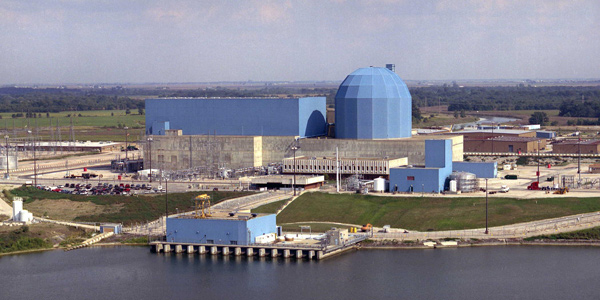By Rich Heidorn Jr.
Independent power producers on Tuesday filed suit in federal court challenging Illinois’ zero-emission credits for Exelon’s Quad Cities and Clinton nuclear plants, calling the program “illegal and unfair.”
The lawsuit seeks to overturn the Future Energy Jobs Act, which authorized the ZEC program, contending the law violates FERC jurisdiction over the wholesale electricity market.

Exelon’s Clinton Nuclear Plant | Nuclear Regulatory Commission
It was filed in the Northern District of Illinois, Eastern Division, by the Electric Power Supply Association (EPSA), Dynegy, Eastern Generation, NRG Energy and Calpine, naming the Illinois Power Agency and the Illinois Commerce Commission as defendants (1:17-cv-01164).
Jonathan Schiller, a managing partner of the plaintiffs’ attorneys Boies, Schiller & Flexner, said Illinois’ legislation will fail for the same reason that the Supreme Court last year unanimously rejected Maryland’s attempt to subsidize a combined cycle plant. (See Supreme Court Rejects MD Subsidy for CPV Plant.)
“The Hughes [v. Talen Energy] decision clearly stated subsidies tied to wholesale power market prices — such as ZECs — are plainly illegal. The ZEC program is designed to allow Illinois to take actions that directly affect the wholesale electric market in an attempt to replace the federally regulated market prices with costs determined by the state instead,” Schiller said. “The credits are directly tied to the Illinois nuclear plants’ participation in interstate energy markets and are unconstitutional as a result.”
The plaintiffs cite an estimate that the out-of-market payments will total $235 million annually over 10 years.
Separately, EPSA also made two filings with FERC calling for expedited action to reject the ZEC programs in Illinois and New York. New York’s program also has been challenged, despite regulators’ contention that the program was designed to avoid the jurisdictional problems cited by the court in Hughes.
EPSA said its filings — answers to other parties’ comments — argue “that there is no merit to the procedural or substantive objections raised, urging the commission to act decisively and without delay” (EL16-49, EL13-62).
The commission, however, will be unable to act until a third commissioner is confirmed to restore its quorum.
EPSA noted with alarm that officials in Connecticut, New Jersey and other states are considering ZEC-type supports for their nuclear fleets.
“The commission should not allow opposing parties to obfuscate matters and should remain focused on the issue at hand to address the recognized threat to the markets through imposition of a minimum offer price rule (MOPR) on existing units for the capacity auctions used in New York and PJM to protect consumers and markets,” EPSA President John E. Shelk said in a statement. “FERC should take this corrective action and then work with all stakeholders on fuel-neutral market reforms and state concerns consistent with competitive market principles.”




